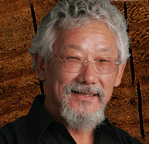By David Suzuki (originally published on the David Suzuki Foundation website)
Who is influencing Canada’s resource priorities? In a puzzling appeal to anti-American sentiment, some industry supporters claim that U.S. foundations are threatening Canadian policy by donating money to environmental groups here. These arguments have appeared in publications such as the Vancouver Sun and Calgary Herald, and on Sun TV.
Greenpeace has released research that points in a different direction, one that seems more logical. The Greenpeace report, “Who’s Holding Us Back?”, shows that multinational and U.S. corporations in the oil, mining, and chemical sectors, among others, have been spending money and using industry trade associations, think-tanks, lobbying, and revolving doors between government and industry to block action on climate change and influence resource policy in Canada and elsewhere.
Opponents of environmental initiatives point to recent protests against the Enbridge Northern Gateway pipeline, which would carry bitumen from the Alberta tar sands to B.C.’s north coast. They say this opposition is part of a conspiracy by U.S. funders to ensure that oil keeps flowing to the U.S. and not to Asia. That the same people also oppose the Keystone XL pipeline, which would take bitumen from the tar sands to the U.S., doesn’t faze those who promote this twisted logic.
If these conspiracy theorists were truly upset about U.S. influence on Canadian infrastructure and resource development, they would lobby for greater national control of the oil industry, much of which is owned by U.S. and Chinese corporations. They might also question U.S. industry and foundation funding for organizations such as Canada’s right-wing Fraser Institute, which has the same charitable status as the David Suzuki Foundation and other conservation groups and is thus governed by the same rules.
The criticism of U.S. money going to Canadian non-profits is part of a recent spate of efforts to silence those who want to bring more balance to discussions about the fossil fuel industry and environmental issues. Sun Media, owned by media giant Quebecor, has been especially aggressive in its opposition to those who don’t go along with its pro-government, pro-industry way of thinking, with recent attacks on environmental groups and the CBC.
In one of those “revolving door” scenarios that the Greenpeace research highlights, Kory Teneycke left his position as Prime Minister Stephen Harper’s communications director to join Sun TV before its launch. Several reporters who were considered for positions at the TV channel have said that Teneycke told them part of their job would be to go after me. Sun Media has also campaigned to have the David Suzuki Foundation’s charitable status removed. Of course, one of Sun TV‘s major personalities, Ezra Levant, has strong ties to the Harper government. He also launched the “ethical oil” campaign, which was taken over by Alykhan Velshi, who was recently hired as Stephen Harper’s planning director.
I wish I had the kind of influence over public policy that anti-environmentalists and news media claim I have but, alas, I think Greenpeace is much closer to the mark in saying that corporate interests, including many foreign interests, wield more power.
As for funding, just as we’re glad that Canadians donate money to important causes worldwide — from earthquake relief in Haiti to aid for famine victims in Africa — we’re pleased that people outside our borders understand the global importance of environmental protection in Canada.
Like many environmental organizations, the David Suzuki Foundation is able to do its work thanks to the many people who give us their time and money. Over half of our funding (55 per cent) comes in donations from about 28,000 individuals — more than 9,000 of whom give us a bit of money every month. Philanthropic foundations and businesses provide the rest. Our funding from sources in the U.S. and other countries ranges from six to 10 per cent per year. All must meet the requirements of our ethical gift acceptance policy
I encourage everyone to carefully consider the arguments on both sides. If you agree that Canadians should help slow rampant extraction and use of fossil fuels to protect the environment and human health, then please support our work and the work of similar organizations. And although we’re extremely grateful for all the support we get from Canadians, we’re happy to accept donations from people anywhere in the world who want to protect nature, and fend off its enemies.
Originally published on the David Suzuki Foundation website, reprinted with permission.
Subscribe to our newsletter
Stay up to date with DeSmog news and alerts







